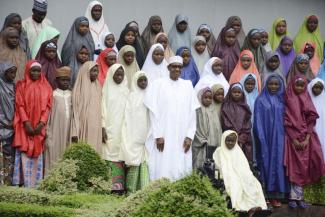Elections
A looming national crisis

Nigeria made international headlines in February when the Islamic terrorist group Boko Haram once again kidnapped over 100 schoolgirls, this time from Dapchi, a town in the northeast. Nevertheless, the reaction was little more than a shrug, even within Nigeria. Most of the girls were released in March. Their kidnapping was at best a poor imitation of the abduction of the Chibok schoolgirls in 2014.
As cruel as the fate of those girls was, it seemed like business as usual to Nigeria’s public. After all, Islamist terror, kidnappings, organised crime, ethnic clashes and piracy have been part of everyday life for years. What is often overlooked, however, is that Nigeria’s democratically legitimate institutions have been remarkably stable for almost 20 years, despite violent conflicts, crushing poverty and systemic corruption. So is everything the same as it has always been?
No, it is not. One must consider the situation in light of the elections scheduled for early 2019. There is a lively debate going on about the leadership of President Muhammadu Buhari. At the same time, a power struggle is raging within the political class. Olusegun Obasanjo, a former president, has once more raised his voice and given the signal to take down the incumbent. Four years ago, Obasanjo spoke out against President Goodluck Jonathan. This time, his target is his former subordinate, Buhari.
His attack against the head of state has fallen on fertile ground. It reflects the disappointment felt by many people from all walks of life, particularly among the power elite and to a certain extent the large middle class. Even during Buhari’s first year in office, it became clear that expectations were exaggerated. The former coup leader and military dictator did not manage to set a stable course for the ship of state, which had sprung many leaks under Jonathan’s leadership. He lacked the appropriate political and socio-economic expertise as well as competent senior staff. Indeed, he was overthrown as junta leader back in 1985 for the same reasons. Today, he is 76 years old and in poor health. He looks helpless as domestic turmoil is rocking most of Nigeria’s 36 states. Though he proved able to hamstring the military capability of Boko Haram, an end to the terrorist attacks is not in sight.
Islamist terror has largely overshadowed the country’s other causes of conflict. They include, above all, the ethnically and religiously-tinged violent crime of central Nigeria, the resurgence of Igbo nationalism in the southeast and the constant threat of another insurrection by new militia groups in the Niger Delta and along the coast. Such issues are evidence of complex dynamics. Power is being consolidated at regional levels in a way that Buhari has long ignored and probably does not really understand. His loss of authority is unmistakable. His credibility as a crisis manager has foundered in the minefield of Nigerian domestic policy. Anti-Buhari forces are forming a broad front. Among their ranks is the National Assembly, which has used budget law and the legislative process to test the president’s power and further erode his authority.
Buhari’s electoral victory in 2015 prevented a national crisis and put a stop to the plundering of the state coffers committed by his predecessor. Now the economic and political elite must find a way to solve the urgent problem of leadership, not least to their own benefit. So far, they have always managed to preserve a system that grants them enormous wealth.
The political fate of the president remains uncertain. It is still possible for him to step down with dignity. In this regard, his sharpest critics are actually helping him. If Buhari campaigns for the highest office once more and wins re-election, a national crisis is more or less guaranteed. It could turn out to be moderate or severe, and devastating impacts would be felt all over West Africa.
Heinrich Bergstresser is a freelance journalist and an independent research associate at the German Institute of Global and Area Studies (GIGA) in Hamburg. His book “Nigeria – Die IV. Republik zwischen Demokratisierung, Terror und Staatsversagen (1999–2017)”, was published by Brandes und Apsel this year.
heinrich.bergstresser@web.de







